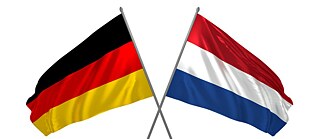The Germans and the Dutch
Conversing in Two Languages

Transnational communication is just part of everyday life for people living on the German-Dutch border. It works well even if the Germans and the Dutch talk to one another in their own mother tongues, as Professor Gunther De Vogelaer from the University of Münster knows.
Professor De Vogelaer, which language do Germans and Dutch people living in border regions such as Westmünsterland use when speaking to one other?
50 or 100 years ago, people living in this region would have automatically spoken in their respective dialects, which were very similar on both sides of the border. Today only few people still speak dialect. Nonetheless, recent studies show that people speak the language of their neighbouring country relatively well, though the Dutch find it easier to switch to German than vice versa.
Are there any other peculiarities?
 Professor Gunther de Vogelaer | Photo (detail) © Private
Yes, people engaging in cross-border communication – above all in professional contexts – may well fall back on their own native tongues: in other words, the Dutch will speak Dutch to the Germans, who will then reply in German. Many find it very convenient to communicate in this manner because it allows all participants to express themselves with great precision. This happens particularly during personal conversations within companies or organizations. Technical terms can cause problems in verbal communication because it is difficult to find a suitable translation. So they are not translated if the speaker finds it more economical and more efficient in terms of communication to rely on the listener’s receptive skills in the foreign language. In some cases e-mails are also sent off in German, and the Dutch reply in Dutch.
Professor Gunther de Vogelaer | Photo (detail) © Private
Yes, people engaging in cross-border communication – above all in professional contexts – may well fall back on their own native tongues: in other words, the Dutch will speak Dutch to the Germans, who will then reply in German. Many find it very convenient to communicate in this manner because it allows all participants to express themselves with great precision. This happens particularly during personal conversations within companies or organizations. Technical terms can cause problems in verbal communication because it is difficult to find a suitable translation. So they are not translated if the speaker finds it more economical and more efficient in terms of communication to rely on the listener’s receptive skills in the foreign language. In some cases e-mails are also sent off in German, and the Dutch reply in Dutch.
Yes, that is why this form of communication is also common in Scandinavia, where the languages are very similar, as well as between the Spanish and Portuguese or between the Slovaks and the Czechs. Nonetheless, even in the German-Dutch border region this only works between people who have regular cross-border contact. I am speaking from experience: being from Belgium myself, I only learnt German once I was already working in Münster. What happened when I first encountered the vice chancellor of the University of Münster is that she spoke German to me and I spoke Dutch. We were able to understand each other well. Having said that, I had already been in Germany for six months by that time, and the vice chancellor is in regular contact with Dutch partner universities.
Where else does cross-border communication take place?
In many areas, such as in law, politics or business. The police in the two countries also work together, as do hospitals. What is more, in the German state of North Rhine-Westphalia there are villages and small towns close to the Dutch border that are home to many Dutch people, though they still work in the Netherlands. Dutch plays an important role in everyday life in these communities, be it on the street or in shops. There are also communities that have bilingual nursery schools.
You mentioned that fewer Germans speak Dutch than the other way around. Why do you think that is?
A lot more importance is attached to teaching German in Dutch schools than to teaching Dutch in Germany – though Dutch is being taught more and more in Germany nowadays. Germany is a major economic power, so a command of the German language opens the door to Europe’s biggest market for the Dutch. Such considerations are taken into account when planning school curricula.
One should be cautious about making generalizations. However, it is indeed the case in other regions that it tends to be less important for a large language area to learn the language of the smaller neighbouring country than the other way around. Large language areas with considerable economic potential more rarely include foreign languages in their school curricula than small countries do, whose inhabitants need to cross national borders in order to access the international stage and who require another language to do so.
What do the Germans and Dutch think of one another?
In the main, both countries take a positive view of the other country’s language. If Germans in border regions are asked about their opinion of the Dutch and the Dutch language, they say that they find the Netherlands very fascinating and would actually like to be able to speak a little Dutch themselves.
50 or 100 years ago, people living in this region would have automatically spoken in their respective dialects, which were very similar on both sides of the border. Today only few people still speak dialect. Nonetheless, recent studies show that people speak the language of their neighbouring country relatively well, though the Dutch find it easier to switch to German than vice versa.
Are there any other peculiarities?
 Professor Gunther de Vogelaer | Photo (detail) © Private
Yes, people engaging in cross-border communication – above all in professional contexts – may well fall back on their own native tongues: in other words, the Dutch will speak Dutch to the Germans, who will then reply in German. Many find it very convenient to communicate in this manner because it allows all participants to express themselves with great precision. This happens particularly during personal conversations within companies or organizations. Technical terms can cause problems in verbal communication because it is difficult to find a suitable translation. So they are not translated if the speaker finds it more economical and more efficient in terms of communication to rely on the listener’s receptive skills in the foreign language. In some cases e-mails are also sent off in German, and the Dutch reply in Dutch.
Professor Gunther de Vogelaer | Photo (detail) © Private
Yes, people engaging in cross-border communication – above all in professional contexts – may well fall back on their own native tongues: in other words, the Dutch will speak Dutch to the Germans, who will then reply in German. Many find it very convenient to communicate in this manner because it allows all participants to express themselves with great precision. This happens particularly during personal conversations within companies or organizations. Technical terms can cause problems in verbal communication because it is difficult to find a suitable translation. So they are not translated if the speaker finds it more economical and more efficient in terms of communication to rely on the listener’s receptive skills in the foreign language. In some cases e-mails are also sent off in German, and the Dutch reply in Dutch.
Understanding the other language
Dutch and German are languages that are closely related to one another. Is that the reason why this kind of cross-border communication is possible?Yes, that is why this form of communication is also common in Scandinavia, where the languages are very similar, as well as between the Spanish and Portuguese or between the Slovaks and the Czechs. Nonetheless, even in the German-Dutch border region this only works between people who have regular cross-border contact. I am speaking from experience: being from Belgium myself, I only learnt German once I was already working in Münster. What happened when I first encountered the vice chancellor of the University of Münster is that she spoke German to me and I spoke Dutch. We were able to understand each other well. Having said that, I had already been in Germany for six months by that time, and the vice chancellor is in regular contact with Dutch partner universities.
Where else does cross-border communication take place?
In many areas, such as in law, politics or business. The police in the two countries also work together, as do hospitals. What is more, in the German state of North Rhine-Westphalia there are villages and small towns close to the Dutch border that are home to many Dutch people, though they still work in the Netherlands. Dutch plays an important role in everyday life in these communities, be it on the street or in shops. There are also communities that have bilingual nursery schools.
You mentioned that fewer Germans speak Dutch than the other way around. Why do you think that is?
A lot more importance is attached to teaching German in Dutch schools than to teaching Dutch in Germany – though Dutch is being taught more and more in Germany nowadays. Germany is a major economic power, so a command of the German language opens the door to Europe’s biggest market for the Dutch. Such considerations are taken into account when planning school curricula.
Large versus small language area
Can the phenomenon of people in small countries being more likely to speak the language of their larger neighbour than vice versa be applied to other border regions?One should be cautious about making generalizations. However, it is indeed the case in other regions that it tends to be less important for a large language area to learn the language of the smaller neighbouring country than the other way around. Large language areas with considerable economic potential more rarely include foreign languages in their school curricula than small countries do, whose inhabitants need to cross national borders in order to access the international stage and who require another language to do so.
What do the Germans and Dutch think of one another?
In the main, both countries take a positive view of the other country’s language. If Germans in border regions are asked about their opinion of the Dutch and the Dutch language, they say that they find the Netherlands very fascinating and would actually like to be able to speak a little Dutch themselves.
Gunther De Vogelaer (born in 1977) has been a professor of Dutch philology at the University of Münster since 2011. He researches language variations, and especially the linguistic situation in the German-Dutch border region.